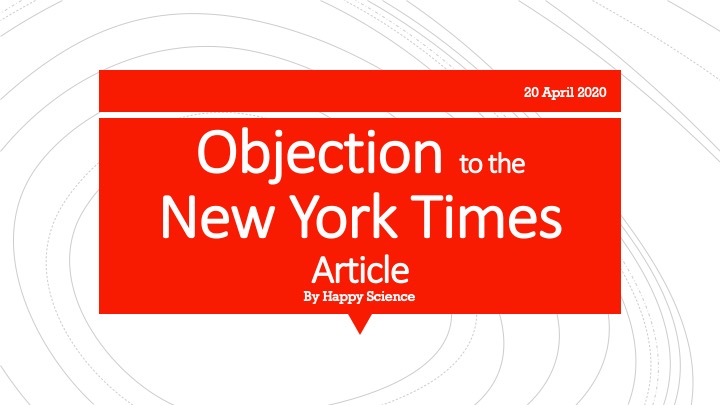
Objection to the New York Times Article by Happy Science
On April 16, The New York Times (NYT) released an article, “Inside the Fringe Japanese Religion That Claims It Can Cure Covid-19” by Mr. Sam Kestenbaum on its online edition, which contains both objective tones and factual errors that disparages members of Happy Science and the organisation’s efforts to guide faith seekers during this difficult time. This article was released in NYT’s weekend printed edition with the title, “Battling Viral Demons, But for a fee”, again on April 20.
The following are corrections to three glaring errors in the article.
1) Happy Science is not a Doomsday Cult:
The article writes, “The coronavirus pandemic has proved to be a perfect vehicle for the religion’s apocalyptic themes and esoteric doctrines.” As an internationally recognized authentic religious organization, Happy Science teaches salvation of the soul through “teachings of the mind”, including its core teaching of the Fourfold Path (the principles of love, wisdom, self-reflection and progress), and is vehemently committed to the betterment of society. A focus of Happy Science is to bring greater happiness and balance to humanity to ultimately achieve a utopian ideal. What should not be overlooked are the many faithful who, by their own admission, cherish the teachings of Ryuho Okawa.
Happy Science is committed to guide members and faith seekers to overcome hardships during this global pandemic as part of its religious mission; therefore, is disseminating timely and spiritually sourced teachings to build “immunity through faith” when there is no immediate cure for this disease.
Happy Science is not a “gold-digger,” as the article asserts and does not utilize a “pay-to-progress system of membership.” The statement “Opponents accuse the group of fleecing acolytes in what they say amounts to a pyramid scheme” is baseless, as donations are faith driven voluntary expressions of gratitude.
Regarding the articles use of the term “cult,” the Happy Science Group entertains activities outside of a religious influence. The organization operates two junior and senior high schools with official approval by the government. The organization also supports philanthropic activities, including disaster recovery assistance, suicide prevention and yearly scholarship awards to members in developing nations who seek academic enrichment. The ministries of Happy Science are widely accepted in the many countries that welcome the organization’s presence; therefore, the assertion of a myopic focus expresses an editorial bias.
2) The Activity to Support Those Who Suffer From the Novel Coronavirus:
While the international community battles this pandemic, it has been focused on materialistic measures while neglecting spiritual influences. Happy Science does not deny the value of medicine and scientific discovery; however, it teaches to confront illnesses from a spiritual perspective. People are prone to illness when they harbour negative feelings, such as “fear” in their mind; therefore, it is important to remove negative influences to guard from maladies.
Virus infection is the same as possession from a spiritual point of view. Happy Science teaches that we can improve the chance of protecting people from infection, namely COVID-19, by strengthening faith to fend-off possession – this is the mechanism of “immunity through faith.” Prayers are an important aspect of religious practice. While there are many examples of miraculous healing through prayers, Happy Science does not encourage members to rely on miracles alone, and teaches that miracles are an occurrence of pure faith, when necessary. The mission of Happy Science is to spread the teachings of Ryuho Okawa that save human souls and to guide society towards sustainable happiness in this world and the next. The organization does not conduct activity for the sake of monetary gain. Happy Science USA is a registered non-profit organization with all activities supported by member donations. Pious expressions of faith to God should not be mocked.
3) Quoting Wrong Source of Information:
Happy Science is not “hostile to the media,” as the article writes. The organization’s founder Ryuho Okawa has appeared in interviews and media segments, notably a piece in The Financial Times on October 19, 1991. Ryuho Okawa was interviewed by Japanese TVs too.
Regarding Hiroshi Okawa and Kyoko, Mr. Yushi Hagimoto, the chief minister of Happy Science New York, offered a precise explanation when he was interviewed, yet his comments were withheld. For instance, the article writes, “Happy Science’s claim of 11 million members also seem unlikely. When Mr. Okawa’s first wife, Kyoko, left the group in 2011 she estimated real membership was 30,000.” In the context of the source material for this claim, 30,000 is the number of dedicated benefactors who passionately supported the organization ten years before that time; there are 72,000 members in Nepal alone. Mr. Hagimoto also addressed the pending legal actions that Happy Science has filed against Hiroshi Okawa for defamation; however, it too was withheld. From this critique alone, it is evident that the article has presented biased assertions, absent of fact. There is no judgement of right from wrong with fair journalism.
At present, Hiroshi Okawa has been spreading falsehood citing this media article, and continues to disturb our members for gratuitous attention. In this regard, Happy Science formally requests The New York Times to take responsibility for citing disreputable sources and perpetuating an unfounded bias of Happy Science and Ryuho Okawa.
Happy Science sincerely hopes that The New York Times will take proper actions to remedy editorial errors, and reconstitute its credibility to further social justice as one of the world’s leading journalistic forums.
Lastly, Happy Science would like to express its deepest condolences to the deceased and those who have lost loved ones from this ruthless pandemic. Happy Science extends blessings and gratitude to health care professionals and first responders who selflessly commit their precious existence to save the lives of others.
Happy Science International Headquarters
Inside the Fringe Japanese Religion That Claims It Can Cure Covid-19
